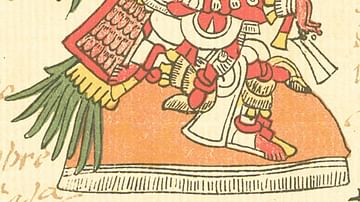Search
Search Results

Definition
Kukulcan - The Feathered-Serpent God of Mesoamerica
Kukulcan (pron. Koo-kool-kan) is the name of a feathered serpent god in the mythology and religion of Mesoamerica, in particular, the Yucatec Maya. He is also identified as the feathered serpent god Quetzalcóatl by the Toltecs and Aztecs...

Definition
Tlahuizcalpantecuhtli
Tlahuizcalpantecuhtli, 'Dawn Lord,' was a Mesoamerican god who represented a menacing aspect of Venus, the morning star, and was one of the four gods which held up the sky. The people of the ancient Americas believed his rays could damage...

Definition
Science
The term science comes from the Latin word scientia, meaning "knowledge". It can be defined as a systematic attempt to discover, by means of observation and reasoning, particular facts about the world, and to establish laws connecting facts...

Article
Jade in Mesoamerica
Jade was a highly-esteemed material in many Mesoamerican cultures, making it a valued regional trade good and first choice for objects of religious and artistic value such as masks, ceremonial axeheads, figurines, and jewellery. Jade, because...

Definition
Chichen Itza
Chichen Itza, located at the northern tip of the Yucatán Peninsula of modern Mexico, was a Maya city which was later significantly influenced by the Toltec civilization. Flourishing between c. 750 and 1200 CE, the site is rich in monumental...

Image
Map of the Cradles of Early Civilization - Global Pathways to Agriculture, Urban Centers & Early States
A map of the cradles of early civilization. The pathways toward early civilization between c. 12,000 and 1,000 BCE were neither uniform nor linear. In the wake of the last Ice Age, climatic change encouraged communities in different parts...

Image
Map of the Indus Valley Civilization, c. 3300-1300 BCE
This map illustrates the extent and key urban centers of the Indus Valley Civilization (circa 3300–1300 BCE), one of the world’s earliest complex societies. Spanning parts of modern-day Pakistan and northwest India, this civilization was...

Definition
Teotihuacan
Teotihuacan, located in the Basin of Central Mexico, was the largest, most influential, and most revered city in the history of the New World. It flourished in Mesoamerica's Golden Age, the Classic Period of the first millennium CE. Dominated...

Definition
Tezcatlipoca - The Greatest of Aztec Gods
Tezcatlipoca (pron. Tez-ca-tli-po-ca) or 'Smoking Mirror' in Nahuatl was one of the most important gods in Postclassical Mesoamerican culture and particularly important for the Toltecs and the Aztecs, especially at Texcoco. He was an invisible...

Definition
Ghosts in the Ancient World
A belief in an afterlife was central to every major civilization of the ancient world and this encouraged the recognition of the reality of ghosts as the spirits of the departed who, for one reason or another, either returned from the realm...